reply to +宾语=answer +宾语
reply和answer

reply和answerreply和answer都有“回答”的意思。
在用法上还是有些不同的。
例句:Do you want to reply to him?你想答复他吗?I asked her a question, but she didn't answer me.我问了她一个问题,但是她没有回答我。
他对我回以微笑。
He ______________ a smile.答案:answered me with一言辨异Don't answer my question at once. You can reply to me three days later. 不要马上回答我的问题。
你可以三天后答复我。
reply短语:1.in reply 作为答复2.no reply 无回答,无应答3.reply for 代表…作答4.reply immediately 速复5.new reply 新回复answer短语:1.in answer to 回答;应…要求2.answer for 因……而受罚;对……负责3.no answer 无应答;舵失灵4.answer the phone 接电话5.answer the following questions 回答下列问题6.wrong answer 答案错误7.answer sheet n. 答案纸8.short answer 简答题;简短回答9.answer the telephone 接电话10.immediate answer 立即应答11.answer back 应答,回复;顶嘴12.know all the answers 见多识广;自命不凡;好象什么都知道的样子13.soft answer 温和的回答;轻轻的回答;委婉的回答14.answer key 答案;题解;练习答案(解答)15.answer the needs of 满足...需要16.answer up 迅速回答17.answer phone 留言机,电话录音机;电话留言;接电话。
answer 与 reply 的用法区别

answer 与reply 的用法区别1. 两者均可表示“回答”,但answer 属常用词,多用于一般性应答,而reply 则较正式,多指经过考虑而作出答复。
如:He answered my letter. 他给我回了信。
(指他在信中说信已收到等)He replied to my letter. 他给我回了信。
(指他在信中把我提出的问题都作出回答)若不细分,两者可换用。
如:I was so nervous that I couldn’t answer [reply]. 我紧张得没作回答。
2. answer 可自由地用作及物或不及物动词,而reply 除后接that 从句或引出直接引语是及物动词外,一般只用作不及物动词。
其后若接名词或代词作宾语,应借助介词to。
如:He replied that he had changed his mind. 他回答说他改变了主意。
He didn’t answer [reply to] my question. 他没有回答我的问题。
比较下面两句:He did not know what to reply. 他不知道回答什么(即:用什么回答)。
He did not know what to reply to. 他不知道回答什么问题(即:对什么作回答)。
3. answer 除表示“回答”外,还可表示接听(电话)或对门铃等声响作出反应等(常与telephone, door, bell, door-bell 等连用)。
但reply 不能这样用。
如:Who answered the telephone? 谁接的电话?A little girl answered the door. 一个小女孩应声去开门。
Nobody answered my call for help. 没有人理会我的呼救。
4. 两者除用作动词外,都可用作名词。
要表示“对……的回答(答复,答案)”等,其后均接介词to (不用of)。
reply的用法有哪些 如何运用

reply的用法有哪些如何运用reply的释义:v.回复;答复;回答;回应;作出反应;n.答复;回答。
例句:He said in reply that the question was unfair.他回答说这个问题不公平。
reply的用法1.reply用作名词的意思是“回答,答复”,引申可指“答案”。
2.reply常与介词to连用。
3.当reply指“回答”时,是及物动词。
4.当reply指“答复”时,是不及物动词,如有宾语应加介词to,宾语应该是答复的具体对象。
5.reply后不可接人和that从句;6.answer与reply有区别:answer是及物动词,可以直接跟宾语,也可以用answer to的结构,前者更常用。
而reply作“答复”解时,是不及物动词,必须用to。
answer有具体回答问题的意思,而reply 仅仅是回复。
7.reply可用作及物动词,也可用作不及物动词。
用作不及物动词时常与介词to或for连用; 用作及物动词时接that引导的宾语从句,有时也可引出直接引语。
reply的例句Please reply as soon as is practicably possible.请尽早回复。
I’m always emailing her, but nine times out of ten she doesn’t reply.我常常给她发电邮,但十之八九她都不回复。
I asked her what her name was but she made no reply.我问她叫什么名字,但她没有回答。
You should receive a reply within seven days.你会在七天之内收到答复。
Morocco scored four goals without reply to win the game.摩洛哥队在一球未失的情况下连入四球,赢得了这场比赛。
reply和answer的用法与to

Reply和Answer的用法与to在英语中,我们经常使用词汇来表达回应或回复某人的话。
其中,“reply”和”answer”是两个常用的词汇,但它们的用法略有不同。
在本文中,我们将深入探讨这两个词汇的用法及其区别。
首先,让我们来看一下”reply”的用法。
“reply”通常用来指作为回应或答复某人的话。
例如,当别人给你发来一封邮件时,你可以用”reply”来表示你收到了并作出了回应。
这个动词强调的是作为对话或通信的一部分,是一种回应或答复的行为。
比如,你可以说:“I replied to his email promptly.”(我及时回复了他的电子邮件。
)而”answer”则更多地侧重于回答问题或提供信息,通常更具体地指对问题或要求的回答。
当你”answer”一个问题时,你在给出具体信息或解释,而不仅仅是对某人的话作出回应。
举个例子,你可以说:“I answered all the questions on the test.”(我回答了测试中的所有问题。
)在一些情况下,“reply”和”answer”可以互相替换使用,但细微区别仍然存在。
“reply”更加抽象和广泛,可以包括任何形式的回应,而”answer”则偏重于解决问题或提供信息。
另外,值得注意的是,当我们使用这两个词汇时,有时需要加上适当的介词”to”。
“reply to”和”answer to”表达了回应或回答某人或某事的行为。
比如,“She replied to my question with a s mile.”(她微笑着回答了我的问题。
)或者,“He answered to the accusations calmly.”(他冷静地对指控作出回应。
)这里的”to”起到连接作用,使得回应或回答与特定对象联系起来。
总的来说,虽然”reply”和”answer”都可以表示回应别人的话,但在细微之处仍有不同。
“reply”更加通用和抽象,着重于作为对话或通信的一部分的回应;而”answer”则更具体,强调解决问题或提供信息。
人教版八年级英语上册笔记1--10单元(原创整理,超详细)
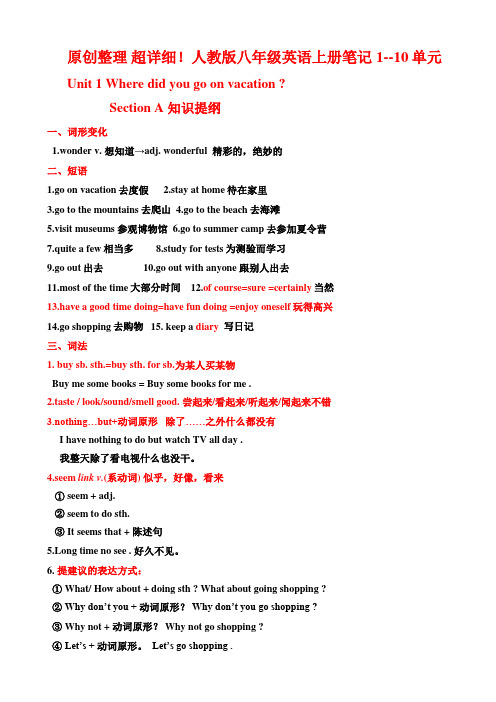
原创整理超详细!人教版八年级英语上册笔记1--10单元Unit 1 Where did you go on vacation ?Section A 知识提纲一、词形变化1.wonder v. 想知道→adj. wonderful 精彩的,绝妙的二、短语1.go on vacation去度假2.stay at home待在家里3.go to the mountains去爬山4.go to the beach去海滩5.visit museums 参观博物馆6.go to summer camp去参加夏令营7.quite a few相当多 8.study for tests为测验而学习9.go out出去 10.go out with anyone 跟别人出去11.most of the time大部分时间 12.of course=sure =certainly当然13.have a good time doing=have fun doing =enjoy oneself玩得高兴14.go shopping去购物 15. keep a diary 写日记三、词法1. buy sb. sth.=buy sth. for sb.为某人买某物Buy me some books = Buy some books for me .2.taste / look/sound/smell good. 尝起来/看起来/听起来/闻起来不错3.nothing…but+动词原形除了……之外什么都没有I have nothing to do but watch TV all day .我整天除了看电视什么也没干。
4.seem link v.(系动词) 似乎,好像,看来① seem + adj.② seem to do sth.③ It seems that + 陈述句5.Long time no see . 好久不见。
6. 提建议的表达方式:① What/ How about + doing sth ? What about going shopping ?②Why don’t you + 动词原形?Why don’t you go shopping ?③ Why not + 动词原形? Why not go shopping ?④Let’s + 动词原形。
动词回复的英文单词

英语中表示回复的动词的用法和例句回复是我们日常交流中经常用到的一个词,它表示对别人的话或者信息做出反应或者答复。
在英语中,表示回复的动词有很多,它们的用法和含义也有所不同。
本文将介绍一些常见的表示回复的动词,以及它们的用法和例句。
1. replyreply是最常见的表示回复的动词,它可以用作及物动词或者不及物动词,后面可以接名词、代词、从句或者to短语。
reply的名词形式是reply,表示回答或者答复。
1.1 reply作及物动词当reply作及物动词时,后面可以接名词、代词或者从句,表示对某人或某事做出回答或者答复。
He replied the email as soon as he received it. 他一收到邮件就立刻回复了。
She replied me that she was busy. 她回答我说她很忙。
They replied that they would come to the party. 他们回复说他们会来参加聚会。
1.2 reply作不及物动词当reply作不及物动词时,后面可以接to短语,表示对某人或某事做出回答或者答复。
也可以不接任何宾语,表示简单地回答或者答复。
He replied to her letter with a phone call. 他用电话回复了她的信。
She didn't reply to my question. 她没有回答我的问题。
He nodded and replied. 他点了点头,然后回答了。
2. answeranswer也是一个常见的表示回复的动词,它可以用作及物动词或者不及物动词,后面可以接名词、代词、从句或者to短语。
answer的名词形式是answer,表示回答或者答案。
2.1 answer作及物动词当answer作及物动词时,后面可以接名词、代词或者从句,表示对某人或某事做出回答或者解释。
He answered the phone and said hello. 他接了电话,说了声你好。
2014年高考高中英语知识点详解及训练(111):reply、answer
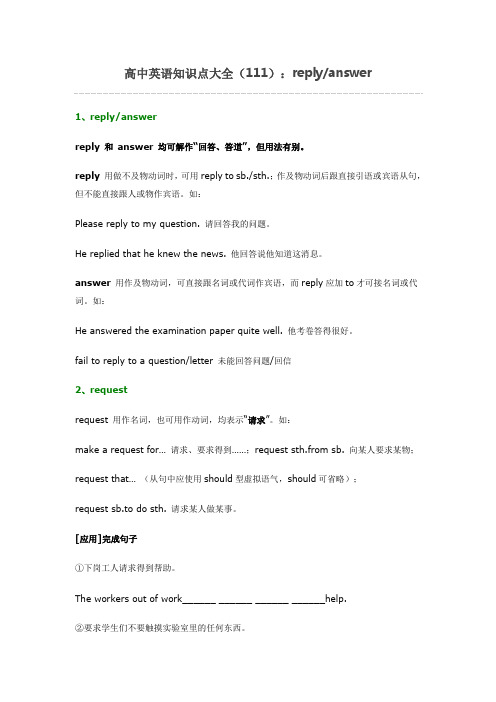
高中英语知识点大全(111):reply/answer1、reply/answerreply 和answer 均可解作“回答、答道”,但用法有别。
reply用做不及物动词时,可用reply to sb./sth.;作及物动词后跟直接引语或宾语从句,但不能直接跟人或物作宾语。
如:Please reply to my question. 请回答我的问题。
He replied that he knew the news. 他回答说他知道这消息。
answer用作及物动词,可直接跟名词或代词作宾语,而reply应加to才可接名词或代词。
如:He answered the examination paper quite well. 他考卷答得很好。
fail to reply to a question/letter 未能回答问题/回信2、requestrequest 用作名词,也可用作动词,均表示“请求”。
如:make a request for… 请求、要求得到……;request sth.from sb. 向某人要求某物;request that… (从句中应使用should型虚拟语气,should可省略);request sb.to do sth. 请求某人做某事。
[应用]完成句子①下岗工人请求得到帮助。
The workers out of work______ ______ ______ ______help.②要求学生们不要触摸实验室里的任何东西。
Students_______ ________not to touch anything in the lab.③我父母要求我再学一门外语。
My parents requested that______ ______ _______a second foreign language. My parents_______me______ ______a second foreign language.Key:①made,a,request,for ②are,requested ③I,should,learn/requested,to,learn3、respect(1)vt.尊重;重视;遵守。
reply和answer的用法和例句

回复(reply)和回答(answer)是英语中常用的词汇,它们都有“回应”、“答复”的意思,但在使用时还是有一些细微的区别。
下面将分别从用法和例句两个方面展开讨论。
回复(reply)的用法和例句:1. 用法:回复通常指对收到的信件、邮件、消息等进行答复,是一种比较正式的表达方式。
可以用在书面或口头交流中。
例句:- I received your em本人l and I will reply to you as soon as possible.- He replied to my letter with a polite message.2. 用法:回复还可以指对某个事件或情况进行回答或做出反应。
例句:- His body language replied that he was not interested in the topic.- The government promised to reply to the public's concerns about the new policy.回答(answer)的用法和例句:1. 用法:回答通常指对问题或询问进行解答,是一种比较普通的表达方式。
可以用在书面或口头交流中。
例句:- She couldn't answer the difficult question in the exam.- The teacher answered all the students' questions patiently.2. 用法:回答还可以指对通联方式、门铃等进行应答。
例句:- He answered the phone and talked with his friend for a while. - I knocked on the door, but no one answered.从以上的例句和用法分析可以看出,reply和answer都是用来表达回应或回答的词汇,但reply更偏向于书面交流和正式场合,而answer 则更通用于口头交流和日常生活中。
同义词辨析:answer,reply,respond,retort,return

同义词辨析:answer,reply,respond,retort,return同义词是指许多意思相近或相同的词语。
在不同的场合使用时,有着细微的差别。
以下是小编为你带来的同义词辨析:answer, reply, respond, retort, return,希望对你有帮助。
answer, reply, respond, retort, return这些动词均有“回答”之意。
answer :常用词,指用书面、口头或行动对他人的请求、询问、质问等作出回答或反应。
reply :较正式用词,较少用于口语。
侧重经过考虑的较正式答复。
respond :正式用词,指即刻的,以口头或行动对外来的号召、请求或刺激等作出回答或响应。
retort :指对不同意见、批评或控诉作出迅速、有力的回答,即“反驳”。
return :正式用词,从本义“归来,回去”引申作“回答、答辨”讲时,含反驳或反唇相讥之意。
answer ['ɑ:nsə, 'æn-]vt. 回答;符合vi. 回答;符合n. 回答;答案;答辩例句:1. We answered their goal with two quick goals of our own.我们快速回敬了他们两个球。
2. Can you the answer to the question?你能找出这个问题的答案吗?reply [ri'plai]vi. 回答;答辩;回击n. 回答;答辩vt. 回答;答复例句:1. She smiled,but didn't reply.她微微一笑,但未作答。
2. He makes no immediate reply.他没有立即做出答复。
respond [ri'spɔnd]vi. 回答;作出反应;承担责任vt. 以…回答n. 应答;唱和例句:1. She responded briefly to the questions.她对这些问题作了简要的答复。
replytosb还是replysb

reply to sb还是reply sb
1、回答某人一般要用reply to sb。
2、使用场合不同:reply to sb是以别人为第一人称;reply sb是以自己为第一人称。
3.含义不同:reply to sb,释义:明确的答复某人;reply sb,直接回答某人。
用法不同
1.reply to sb
用法:reply to sb是被动的,表示做某事给某人,或者是某人是动作的承受者,reply与介词to连用时接that引导的宾语从句,有时也可引出直接引语。
2.reply sb
用法:基本意思是“回答”“答复”“作答”,主要指用语言文字对问题、指控、辩论、质问、起诉或致意等给予回答,也可指用行动回答,是较为正式的书面用语。
高考英语常用同近义词词汇辨析5
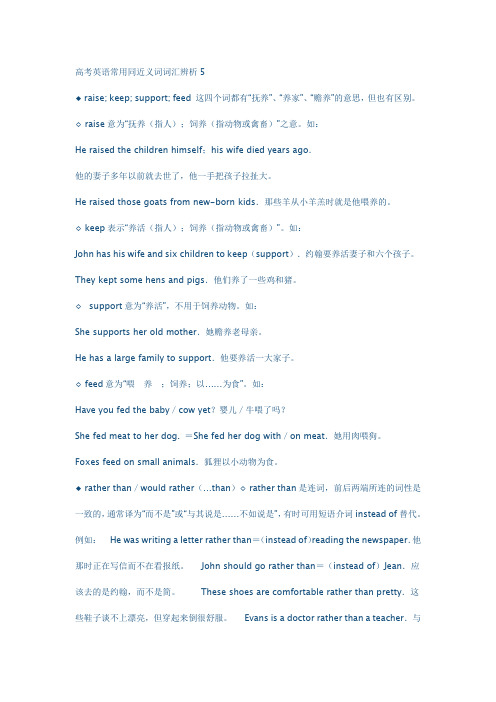
高考英语常用同近义词词汇辨析5◆ raise; keep; support; feed 这四个词都有“抚养”、“养家”、“赡养”的意思,但也有区别。
◇ raise意为“抚养(指人);饲养(指动物或禽畜)”之意。
如:He raised the children himself;his wife died years ago.他的妻子多年以前就去世了,他一手把孩子拉扯大。
He raised those goats from new-born kids.那些羊从小羊羔时就是他喂养的。
◇ kee p表示“养活(指人);饲养(指动物或禽畜)”。
如:John has his wife and six children to keep(support).约翰要养活妻子和六个孩子。
They kept some hens and pigs.他们养了一些鸡和猪。
◇support意为“养活”,不用于饲养动物。
如:She supports her old mother.她赡养老母亲。
He has a large family to support.他要养活一大家子。
◇ feed意为“喂 养;饲养;以……为食”。
如:Have you fed the baby/cow yet?婴儿/牛喂了吗?She fed meat to her dog. =She fed her dog with/on meat.她用肉喂狗。
Foxes feed on small animals.狐狸以小动物为食。
◆ rather than/would rather(…than)◇ rather than是连词,前后两端所连的词性是一致的,通常译为“而不是”或“与其说是……不如说是”,有时可用短语介词instead of替代。
例如:He was writing a letter rather than=(instead of)reading the newspaper.他那时正在写信而不在看报纸。
reply和answer的用法和区别

reply和answer的用法和区别在英语中,reply和answer两个词经常被人们用来描述回应别人的行为。
虽然它们的作用有些相似,但在使用时还是存在一些细微的区别。
本文将详细探讨reply和answer的用法和区别。
用法解析Reply的用法reply作为动词时,通常指以口头或书面形式对别人的话或行为做出回应。
比如,当你收到一封邮件后,你可以回复邮件中的内容。
reply强调的是对方的一种反应或回答。
Answer的用法answer同样是作为动词使用时,也是指对问题或请求做出回应。
与reply略有不同的是,answer更强调对“问题”的回答,强调的是提供一个准确或完整的解答。
区别对比1.范围不同:reply更注重对方的言行或举动作出的回应,包括但不限于对方提出的问题;而answer更专注于给出问题的正面回答。
2.精确度不同:通常来说,answer所涉及的回复更倾向于通过给出具体的答案或解释来满足对方的疑问;而reply可能更注重对话、讨论的延伸,不一定要有明确的解决方案。
3.形式不同:reply通常可以是一句简短的回复,不一定需要具体的信息;而answer更倾向于提供详细的、正式的答复。
案例分析•当你的朋友问你一个问题:“今天晚上一起吃饭吗?”如果你想简单回答同意,你可以说:“Sure, let’s go!” 这里使用reply更贴近正常对话的语境。
•如果朋友问你一个关于某个数学问题的问题:如果你提供了一个详尽的数学计算,这时更适合使用answer,表明你在回答一个特定的问题。
总结虽然reply和answer在表达上有一定的交集,但它们在使用时还是有所区别。
要根据具体的语境和需要来选择使用哪个词,以确保传达自己的意思准确清晰。
希望通过本文的内容,读者能更好地理解reply和answer的用法和区别,在日常交流中更得心应手。
英语 reply 和 answer 的区别

英语reply 和answer 都有“回答”的意思,今天我们一起学习一下这两个词的用法区别。
1. reply: 这是一个比较正式的词,多用于书面语,指经过思考后一一作答。
其后可接直接引语、宾语从句,同时多数情况下用作不及物动词,与to 连用接宾语。
例句1:I replied that I was unable to help them.
我回复说我不能帮助他们。
例句2:I was unsure how to reply to this question.
我拿不准该如何回答这个问题。
例句3:He never replied to any of my letters.
他从未给我回过信。
2. answer: 这是一个较常用的词,所谓的回答包括口头、书面或行动的回答。
例句4:Who can answer my question?
谁能回答我的问题?
例句5:He went to the desk to answer the phone.
他走向桌子去接电话。
例句6:She answered that she would prefer to walk.
她回答说她宁愿步行。
例句7:She answered me with a smile.
她对我报以微笑。
answer,reply,respond的区别

answer,reply,respond 的区别answer,reply,respond 这组词都有“回答”、“答复”的意思。
answer v. “回答”、“答复”,可指口头或书面。
answer作“回答”讲时,是一方提出问题另一方回答常用词,较常用,我们既可以说answer a question,回答问题,也可以说answer the telephone,接电话。
例句:I asked him a question, but he would not answer.我问了他一个问题,可是他不愿回答。
reply v. “回答”、“答复”,正式用语,可指口头或书面,有经过考虑后较为正式地作出回答的含义。
reply较正式,除了后面跟直接引语或以that开始的句子外,一般只用作不及物动词,后面连用to,表示回答别人的问题(话语、信件、祝贺、攻击等)特别是在写信中常用此句开头:Thank you for your reply.reply在句中用作不及物动词,作“回答”解,常用reply to sb/sth,表示“对……作出回答”。
作名词时,作“回答”、“回信”、“答复”解。
关于reply的词组:reply to sb.(sb.'s question)回答某人(某人的问题)answer和reply都可用作及物动词,作“回答”解,但answer可跟名词作宾语而reply只能跟直接引语或宾语从句,如跟名词,reply后须加to。
例如:Can you answer my question ?你能回答我的问题吗?(也可说Can you reply to my question?)respond vi. “回答”、“答复”,可指口头或书面做出回答,或以具体动作表示答复或回应。
respond作“答”、“回答”讲,为正式用语,常与介词to连用。
通常只对号召、职责、请求、紧急情况等做出反应或回应。
She never responded to his opinion.她从未对他的意见作出过反应。
answerreply单词区分的方法总结
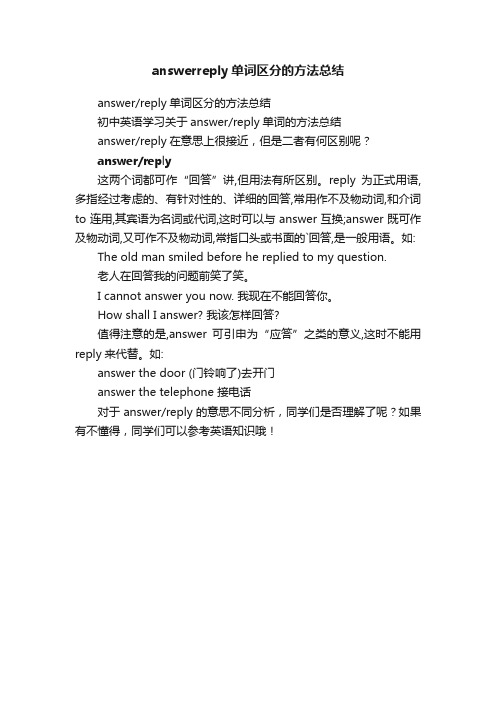
answerreply单词区分的方法总结
answer/reply单词区分的方法总结
初中英语学习关于answer/reply单词的方法总结
answer/reply在意思上很接近,但是二者有何区别呢?
answer/reply
这两个词都可作“回答”讲,但用法有所区别。
reply为正式用语,多指经过考虑的、有针对性的、详细的回答,常用作不及物动词,和介词to连用,其宾语为名词或代词,这时可以与answer互换;answer既可作及物动词,又可作不及物动词,常指口头或书面的`回答,是一般用语。
如: The old man smiled before he replied to my question.
老人在回答我的问题前笑了笑。
I cannot answer you now. 我现在不能回答你。
How shall I answer? 我该怎样回答?
值得注意的是,answer可引申为“应答”之类的意义,这时不能用reply来代替。
如:
answer the door (门铃响了)去开门
answer the telephone 接电话
对于answer/reply的意思不同分析,同学们是否理解了呢?如果有不懂得,同学们可以参考英语知识哦!。
人教版初中英语reply与answer 的用法高频考点、句型讲练

人教版初中英语reply与answer 的用法高频考点、句
型讲练
主题句He hasn’t replied to my email yet.
他还没有回复我的邮件。
考点、reply与answer 的用法比较
1. reply 多用作不及物动词,意为“答复,回复”。
较为正式,多指经过考虑之后而对问题作出解释、辩论或回答。
(除接that从句外)不能直接接宾语,表示“答复某人/某事”,要用reply to + 名词或代词。
He didn’t reply to my invitation.
他没有回复我的邀请。
I’ll write to reply to his questions.
我打算写信答复他的问题。
2. answer 多用作及物动词,意为“回答,答复”。
多指较为简单的一般性应答,也可表示接听(电话)或对门铃等声响做出反应。
可直接接名词或代词作宾语。
Can you answer my questions in English?
你能用英语回答我的问题吗?
Mr. Smith was answering the phone when I came in.
当我进来时,史密斯先生正在接电话。
3. reply 和answer 用作名词时,均与介词to 搭配,表示“……的答案/ 答复”,不能用介词of。
I want to know the answer to this question.
我想要知道这个问题的答案。
九年级英语Unit3重点词语用法归纳 牛津英语
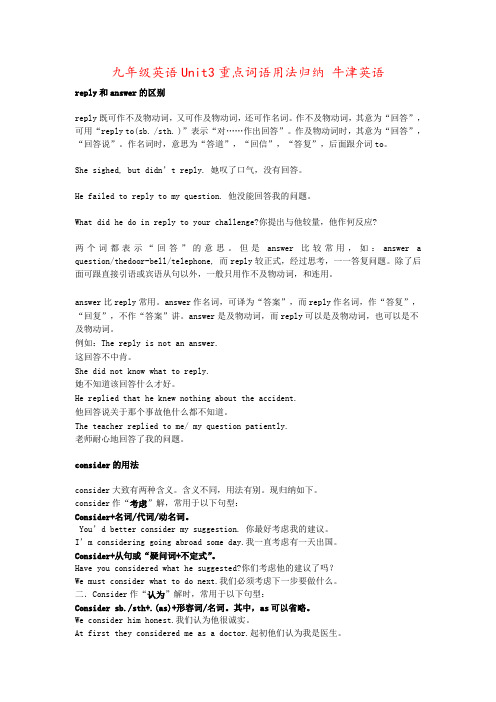
九年级英语Unit3重点词语用法归纳牛津英语reply和answer的区别reply既可作不及物动词,又可作及物动词,还可作名词。
作不及物动词,其意为“回答”,可用“reply to(sb. /sth. )”表示“对……作出回答”。
作及物动词时,其意为“回答”,“回答说”。
作名词时,意思为“答道”,“回信”,“答复”,后面跟介词to。
She sighed, but didn’t reply. 她叹了口气,没有回答。
He failed to reply to my question. 他没能回答我的问题。
What did he do in reply to your challenge?你提出与他较量,他作何反应?两个词都表示“回答”的意思。
但是answer比较常用,如:answer a question/thedoor-bell/telephone, 而reply较正式,经过思考,一一答复问题。
除了后面可跟直接引语或宾语从句以外,一般只用作不及物动词,和连用。
answer比reply常用。
answer作名词,可译为“答案”,而reply作名词,作“答复”,“回复”,不作“答案”讲。
answer是及物动词,而reply可以是及物动词,也可以是不及物动词。
例如:The reply is not an answer.这回答不中肯。
She did not know what to reply.她不知道该回答什么才好。
He replied that he knew nothing about the accident.他回答说关于那个事故他什么都不知道。
The teacher replied to me/ my question patiently.老师耐心地回答了我的问题。
consider的用法consider大致有两种含义。
含义不同,用法有别。
现归纳如下。
consider作“考虑”解,常用于以下句型:Consider+名词/代词/动名词。
reply to +宾语=answer +宾语

第15讲┃Units 3—4,Book 9
短 语 归 纳
allow sb to do sth 1. 允许某人做某事______________ 2.不睡觉;熬夜______________ stay up concentrate on 3.集中精力于______________ an opportunity to do sth 4.有机会去做某事have ______________ volunteer to do sth 5.志愿去做某事______________ in the way 6.挡道的;妨碍人的______________ 7.一点也不;根本不not…in ______________ the slightest/not…at all 8.使……失望______________ let…down come up with 9.提出;想出______________ come out 10.出版;发表______________ 11.严格要求某人______________ be strict with sb
短 语 归 纳
第15讲┃Units 3—4,Book 9
1. “我认为十六岁的孩子不应该被允许驾驶。”“我同意。 他们不够严肃。” —I don't think____________________________________. sixteen year olds should be allowed to drive enough —I agree. They aren„t serious ____________ . 2.那会是一个让老师和学生都高兴的好办法。 That would be a good way ________________________________________________ . to keep both teachers and students happy 3.如果你有一百万美元, 你将做什么? What would you do if you had a million dollars ________________________________ ? 4.如果其他的人都带了礼物怎么办? everyone else brings a present What if ________________________________ ? 5.我不喜欢做演讲。当我在许多人面前说话的时候我会 感到紧张。 making speeches I don't like _______________________________ .I feel talking in front of many people nervous ___________________________________.
辨析reply, answer配套课件

辨析reply, answer
reply (名词)“答复、回答” I received no reply. 我没有收到答复。 answer (名词)“答案、回答” Your answer is wrong. 你的答案是错的。 二者作名词,意为“……的答案或答复”时,均与 to 连用。 I don't know the answer to the question. 我不知道这个问题的答案。
辨析reply, answer
answer 可表示对电话、敲门等作出的“应答”,reply 则不能。 Who answered the telephone? 谁接的电话? 如果是指练习题的“答案”,一般用 answer。 The answer to the question is 16. 这个问题的答案是16。
课堂小结
answer和reply都是名词“答复、回答”,意为“……的答案或答复” 时,均与 to 连用。 reply (动词)“答复、回答”,跟宾语时须与 to 连用。 answer (动词)“回答、答复”,可以直接加宾语。 answer 可表示对电话、敲门等作出的“应答”,reply 则不能。 如果是指练习题的“答案”,一般用 answer。
辨析reply, answer
reply (动词)“答复、回答 replied to my invitation. 他还没有回复我的邀请。 answer (动词)“回答、答复”,可以直接加宾语。 Who can answer this question? 谁能回答这个问题?
即时练习
用reply或answer的适当形式填空。 1. You must __a_n_s_w_e_r__ this letter right away. 2. He __re_p_l_ie_d__ to our invitation yesterday. 3. He has not ___re_p_l_ie_d___ to my question yet. 4. If you can __a_n_s_w_e_r__ the question, hands up! 5. Lily _a_n_sw__e_re_d__ the telephone just now.
reply有几种用法

reply有几种用法收到回复:reply有几种用法...from the BBC in London. The British government...having received no reply to the observations presented...to the German government...——The Pianist...从伦敦BBC。
英国政府...没有收到对所提出的意见的答复...到德国政府...——《钢琴师》一、你知道reply有几种含义吗?n.回答,答复 [U,C]John is amazing in his readiness of reply and his exactness of memory.约翰准备充分的回答和精确的记忆令人惊讶。
v.1.回答,答复,回应,做出反应 [I]She may be offended if you don't reply to her request to attend.你不回复她的邀请,她也许会不高兴的。
二、词义辨析:哪些词还表示相同含义呢?answer, reply, respond, retort, return这些动词均有“回答”之意。
answer常用词,指用书面、口头或行动对他人的请求、询问、质问等作出回答或反应。
reply较正式用词,较少用于口语。
侧重经过考虑的较正式答复。
respond正式用词,指即刻的,以口头或行动对外来的号召、请求或刺激等作出回答或响应。
retort指对不同意见、批评或控诉作出迅速、有力的回答,即“反驳”。
return正式用词,从本义“归来,回去”引申作“回答、答辨”讲时,含反驳或反唇相讥之意。
三、含有reply的常见短语in reply作为对…的回答四,学会reply的用法了吗?来做个测试吧!I should scope out his real goal before I give him a definite _____.我得先琢磨一下他的真正意图,才能给他一个明确的答复。
- 1、下载文档前请自行甄别文档内容的完整性,平台不提供额外的编辑、内容补充、找答案等附加服务。
- 2、"仅部分预览"的文档,不可在线预览部分如存在完整性等问题,可反馈申请退款(可完整预览的文档不适用该条件!)。
- 3、如文档侵犯您的权益,请联系客服反馈,我们会尽快为您处理(人工客服工作时间:9:00-18:30)。
第15讲┃Units 3—4,Book 9
短 语 归 纳
allow sb to do sth 1. 允许某人做某事______________ 2.不睡觉;熬夜______________ stay up concentrate on 3.集中精力于______________ an opportunity to do sth 4.有机会去做某事have ______________ volunteer to do sth 5.志愿去做某事______________ in the way 6.挡道的;妨碍人的______________ 7.一点也不;根本不not…in ______________ the slightest/not…at all 8.使……失望______________ let…down come up with 9.提出;想出______________ come out 10.出版;发表______________ 11.严格要求某人______________ be strict with sb
第15讲┃Units 3—4,Book 9
巧 辩 异 同 offer/provide (1)offer 意为“提供”, 侧重表示“愿意给予”。常 用搭 配:offer sb sth=offer sth to sb提供某人某物 offer to do sth 主动提出做某事 The flight attendant offers me hot water and food. =The flight attendant offers hot water and food to me. 空乘人员给我提供热水和食物。 She offers to show us around. 她主动给我们当导游。
第15讲┃Units 3—4,Book 9 5 come out 出版;发表 [点拨] come out 还可表示“出来;开花;显示”。 Come out and get some fresh air. 出来呼吸点新鲜空气。 The China roses will come out soon. 月季花很快就要开花了。 When will the dictionary come out? 那本字典什么时候出版? The photographs didn't come out very well. 相片冲洗得不是很好。 [拓展] come over 顺便来访 come in 进来 come along 出现;进展 come up with 提出;想出 come and go 来来去去 come from 来自 come true 实现;达到
第15讲┃Units 3—4,Book 9
1. 含should的被动语态及其否定句和一般疑问句。 语法 2.用should来提出建议。 结构 3.虚拟语气。
第15讲┃Units 3—4,Book 9
重 点 突 破
词 汇 点 睛
1 reply v. & n. 回答;答复 [点拨] reply to +宾语=answer +宾语 I asked him but he didn't reply to(=answer) me. 我问他了, 但他没有答复我 。
短 语 归 纳
第15讲┃Units 3—4,Book 9
1. “我认为十六岁的孩子不应该被允许驾驶。”“我同意。 他们不够严肃。” —I don't think____________________________________. sixteen year olds should be allowed to drive enough —I agree. They aren„t serious ____________ . 2.那会是一个让老师和学生都高兴的好办法。 That would be a good way ________________________________________________ . to keep both teachers and students happy 3.如果你有一百万美元, 你将做什么? What would you do if you had a million dollars ________________________________ ? 4.如果其他的人都带了礼物怎么办? everyone else brings a present What if ________________________________ ? 5.我不喜欢做演讲。当我在许多人面前说话的时候我会 感到紧张。 making speeches I don't like _______________________________ .I feel talking in front of many people nervous ___________________________________.
Listening
科目一考试 科目一模拟考试 仿真考试 最新试题
科目二考试 学车驾考科目二 技巧 视频 资料
第15讲┃Units 3—4,Book 9
2 succeed v. 成功;达到;完成 [点拨] succeed in doing sth意为“成功做成某事”。 If you work hard, you will succeed. 如果你努力干, 就能够成功。 He succeeded in getting top marks in chemistry. 他拿到了化学课的最高分。 [拓展] successful adj. 成功的; successfully adv.成功 地; success n. 成功。 Failure is the mother of success. 失败是成功之母。 She is a successful businesswoman. 她是一位成功的女实业家。
第15讲┃Units 3—4,Book 9
(2)provide 指为应付意外、紧急情况等做好充分准 备而“供给, 提供”。provide sb with sth=provide sth for sb 意为“为某人提供某物”。 The school provides food for the students. =The school provides the students with food. 学校为学生们提供伙食。
第15讲┃Units 3—4,Book 9
3 get along with 与……相处 [点拨] 表示“与……相处(融洽)”可以写成get on/along (well) with。另外, get on/along with 还可表示 “取得进展, 继续做”。 The child doesn't get along well with others. 这个小孩不合群。 How have you been getting along with you 再 现
第15讲┃Units 3—4,Book 9
句 型 再 现
6.“我认为学生应该被允许和朋友一起做作业。” “我不同意。他们只是聊天而不是做作业。” be allowed to do —I think students should ____________________ homework with friends. —I disagree.They talk____________________homework. nstead of doing 7.你也宁愿待在家里读一本好书而不愿去参加聚会。 stay at home You would also rather__________________________and go read a good book than________to a party. 8.如果我是你, 我也会和你的朋友谈谈吸烟的危害。 were If I________you, I'd also____________your friend about talk to the dangers of smoking.
第15讲┃Units 3—4,Book 9
in fact 12.事实上______________ introduce sb to… 13. 把某人介绍给„„______________ invite sb to do sth 14.邀请某人做某事______________ at present 15.目前, 现在______________ plenty of 16.很多的, 足够的______________ in public 17.在公共场合, 公开地______________ achieve one's dream 18.实现某人的梦想______________ would rather…than… 19.宁愿„„而不愿______________ clean up 20.打扫, 清扫______________ fail a test 21.考试不及格______________ be serious about 22.对„„认真______________ agree to do sth 23.同意去做某事______________
第15讲┃Units 3—4,Book 9
中考典例 D . Let‟s go Cao Wenxuan‟s new book has just _____ and buy one. [2012· 盐城] e over e down e on e out 解析 根据主语“new book”以及“Let‟s go and buy one. ” 可知是指书刚刚出版了,故选D
第15课时 Units 3—4,Book 9
第15讲┃Units 3—4,Book 9
自 学 反 馈
类别 课标考点要求 1.achieve→(名词) achievement ________ 2.knowledge→(形容词) knowledgeable ______________ listener 3.listen→(名词) ________ medical 4.medicine→(形容词) ________ permission 词汇 5.permit→(名词) ________ energeti 拓展 6.energy→(形容词) ________ confidence 7.confident→(名词) ________ helpful 8.help→(形容词) ________ sleepy 9.sleep→(形容词) 疲倦的 ________ important 10.importance→(形容词) ________
